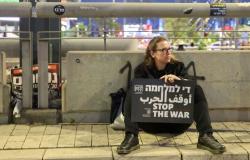Jerusalem, May 2 (EFE) .- This Saturday two months have been completed since Israel forbade Gaza from any supply, including food and drinking water, which according to Oenegés in the field adds to other actions- as the destruction of arable land, bombings and lethal attacks against fishermen- with which the Israeli government seeks to force the expulsion of the Palestinians.
“Thousands of people will die if we do not see an immediate end to the blockade,” Gavin Kelleher, a humanitarian worker of the Norwegian Council for Refugees (NRC) and who returned from Gaza last Monday, said today.
According to him, the current blockade is part of a “broader campaign” to turn Gaza into an uninhabitable place for its 2.1 million Palestinians, because Israel has also destroyed the orchards where the Gazaties cultivated their own food, attacked and forced the closure of dozens of community kitchens maintained by the oenegés and killed fishermen.
“We have also seen direct air attacks against tank trucks,” Kelleher explained, which listed the prohibition of fuel or chemical entry to purify water, in addition to Israeli attacks against telecomunciations, machinery for repairing pipes or the denial of engineers access.
For his part, Ghada Alhaddad, head of media and communication of Oxfam International, denounced that the majority of foods that remain in the Palestinian enclave are not nutritious -the meat and milk are over -while the exorbitant prices make inaccessible those that are.
Alhaddad, who accused Israel of “systematically using hunger as a weapon of war,” recalled how a Gazati mother could only buy a tomato on the market for about five dollars in order to distribute it among her four children. The majority of children, he said, only eat once a day, usually dinner to be able to sleep with something in the stomach.
Already on April 10, the Office of Coordination of Humanitarian Affairs (OCHA), reported that more than 60,000 children suffer from malnutrition in Gaza, “at a time when community dining rooms are running out quickly without fuel and supplies,” said the UN spokesman, Farhan Haq, at a press conference.
“The food crisis is caused by man. We must demand a permanent and immediate fire, the total opening of the border and demand responsibilities,” Alhaddad demanded.
In the same panel, Amjad Shawa, director of the Network of Non -Governmental Palestinian Organizations (NGOP), said today that a total of 30 community kitchens had had to close due to Israeli air attacks, and that dozens had been done later due to lack of flour and basic products.
“The majority of those who will close before a week, in 5 or 6 days,” Shawa estimated, who said that “thousands” of people are dying silently not because of the pumps, but because of the shortage of food and medicines that makes simple infections lethals. EFE






